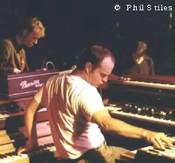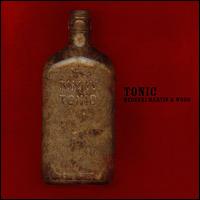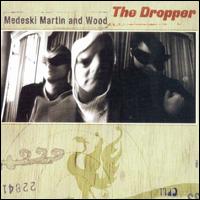
A
FIRESIDE CHAT WITH JOHN MEDESKI
As a member of Medeski, Martin, and Wood, John Medeski sees the future
of jazz on a nightly basis. The audiences at MMW's shows average at about
21 years of age and they dance to the groove that is being produced on
stage. That makes Medeski an authority on the future of the music. Afterall,
he is on the frontline. So here is the man of the hour, unedited and in
his own words.
FRED JUNG: Let's start from the beginning.
JOHN MEDESKI: I started when I was a kid, when I was like five. I started
taking piano lessons, classical piano lessons. That's pretty much all
I've really ever done since I was twelve. I knew around there that this
is what I wanted to do and I kind of started focusing on playing the piano
and on music, all different kinds, everything I could do. I got into jazz
around that time too. When I was like eleven or twelve, I got turned onto
by one of my friend's big brothers. He was listening to jazz and he turned
me onto it. I just got really into it and started checking it out then
and studied. I found a really great teacher and started studying jazz
too.
FJ: What were you listening to?
JOHN MEDESKI: Well, the first one was an Oscar Peterson record, which
is pretty funny. Then I heard some Bud Powell, I guess, was the next thing
that hit me. That blew my mind and Cecil Taylor. I think A Love Supreme
(Impulse!) was another one around that time. It was just great, incredible
music. It's one of the great records. It's great music. It took me a long
time to figure it out. Something about it drew me to it. But I was a kid,
so I just listen to it over and over and over with headphones. That's
kind of what got me into it. I also listened to some other stuff like
Tony Williams' Lifetime, the stuff that other people were listening to.
FJ: How did Medeski, Martin, and Wood come about?
JOHN MEDESKI: We got together in New York. We first just got together
to play, just to play together. We started doing gigs together at this
club called The Village Gate in New York City.
FJ: How long have the three of you, Chris (Wood) and Billy (Martin), been
playing together?
JOHN MEDESKI: Since '91.
FJ: So MMW has been knocking on the door for a while.
JOHN MEDESKI: We were on a different label, Rykodisc, before Blue Note.
We were on Rykodisc, Gramavision, which became part of Rykodisc. We were
on Gramavision and then we got on Blue Note.
FJ: I remember you guys playing the Horde Festival.
JOHN MEDESKI: That's right. We did four Horde Festivals. It was great.
We would only do a little bit at a time. We would do like a two week,
week stint usually. We had a great time doing it. It's a different audience.
It's bigger. It was a different situation than we had been used to at
that time. Since then, we've done a lot of shows like that.
FJ: Through playing alternative festivals you have been very successful
at reaching out and bringing younger audiences to the music.
JOHN MEDESKI: It's beyond cool. It was like the choice we made. Those
guys are going to get older and change too and hopefully, as we do, they'll
be into it. When we first went out to play, we specifically did not play
jazz clubs. We did a couple on one of our first tours and it was such
a weird feeling. We had a better experience playing at coffee houses and
places like that where the younger people were at.
FJ: What is the average age of someone who comes to hear MMW?
JOHN MEDESKI: It's a pretty young audience, twenty-five and under is the
main part of it.
FJ: When you guys are on stage, the audience is dancing to it, grooving
to it, and in some cases doing a pretty hip rave hybrid.
JOHN MEDESKI: Yeah, or just checking it out. That's the way it should
be.
FJ: It is a relaxed vibe and not that sterile atmosphere that most jazz
clubs tend to give off, and you guys are bringing an audience to the music
that ordinarily might never listen to Charles Mingus or Ornette Coleman.
JOHN MEDESKI: It's gratifying when the people that are checking the music
out go and check out Mingus and Duke Ellington or any of the other people.
Sometimes we will play somebody else's song on a gig and then they will
go check out the original. Yeah, that's gratifying to be able to do that,
not do that, but to be a link.
FJ: Let's touch on your debut on Blue Note, Combustication.
JOHN MEDESKI: We did two different weeks. We did a week of recording before
we went on the road. We did a month tour and we came back and did another
week of recording. Blue Note's been great. It's been great. We love the
people who are there and they are really good for us, I think.
FJ: So are you in the studio working on the follow-up?
JOHN MEDESKI: We're going to have a record called Tonic, which is a live,
acoustic, piano, bass, and drums trio set from some live gigs we did in
New York. We probably play an acoustic tour for that. Do a bunch of acoustic
trio gigs for that little period, late spring and summer of this coming
year and then we will see what happens in the fall.
FJ: And do you have a scheduled release date?
JOHN MEDESKI: That's going to come out in April. Right now, we are working
on our other record and that will probably come out sometime in the fall
or something. This is a more electric kind of thing. Definitely the way
we do it.
FJ: Is this going to be the Medeski, Martin, and Wood flavor we are all
accustomed to.
JOHN MEDESKI: No, I think it's a new flavor from New Orleans and some
other flavors. We're going to come back and do some more work on it in
February. We're moving slow with it. We're taking our time. We're trying
out some new things, new vibes.
FJ: Much of your audience may not know this, but you moonlight with DJ
Logic and John Zorn.
JOHN MEDESKI: Oh, yeah. Oh, yeah. A lot of different people. I do different
stuff with Zorn and all those different people. I'm doing some gigs with
Joey Baron.
FJ: Marc Ribot plays with you and Joey.
JOHN MEDESKI: Of course, yeah, I'm doing some gigs with Joey Baron and
Ribot. We play in a trio together. And Zorn, I don't know if a record
will be released, but we have a band that's great. That's one of my favorite
things to do these days. The band is called Emergency. It's live. It's
got Marc Ribot, Kenny Wolleson, who is one great drummer, and Zorn, who
is just incredible. It's just a blast.
FJ: Diversity suits you well.
JOHN MEDESKI: It's the way it's always been for me. I've always done a
lot of different types of things. It keeps me fresh. It keeps me growing.
It keeps me into it.
FJ: Medeski, Martin, and Wood is a touring band, possibly the only one
left in the music.
JOHN MEDESKI: Oh, I love touring, Fred. I love playing out there on the
road, being on the road and playing for people there. We figured if we
played for a while, we'd get something back later and we have.
FJ: What is the oddest place MMW has played?
JOHN MEDESKI: It was East Lansing, Michigan. And the club that we were
supposed to play got closed by the fire marshal the night before, so we
ended up playing like in this little alley next to the club. We brought
all our stuff, B-3 and everything and set it up. The alley way slowly
filled with all of these people. It was pretty wild. It turned into a
pretty bizarre scene.
FJ: What is the challenge for MMW in the coming year and thereafter?
JOHN MEDESKI: To keep it fresh. To keep it exciting for us, so that we
can translate that excitement to the audience. That's always the challenge.
Fred Jung is Jazz Weekly's Editor-In-Chief and Interview Specialist. Comments?
Email
Fred.


